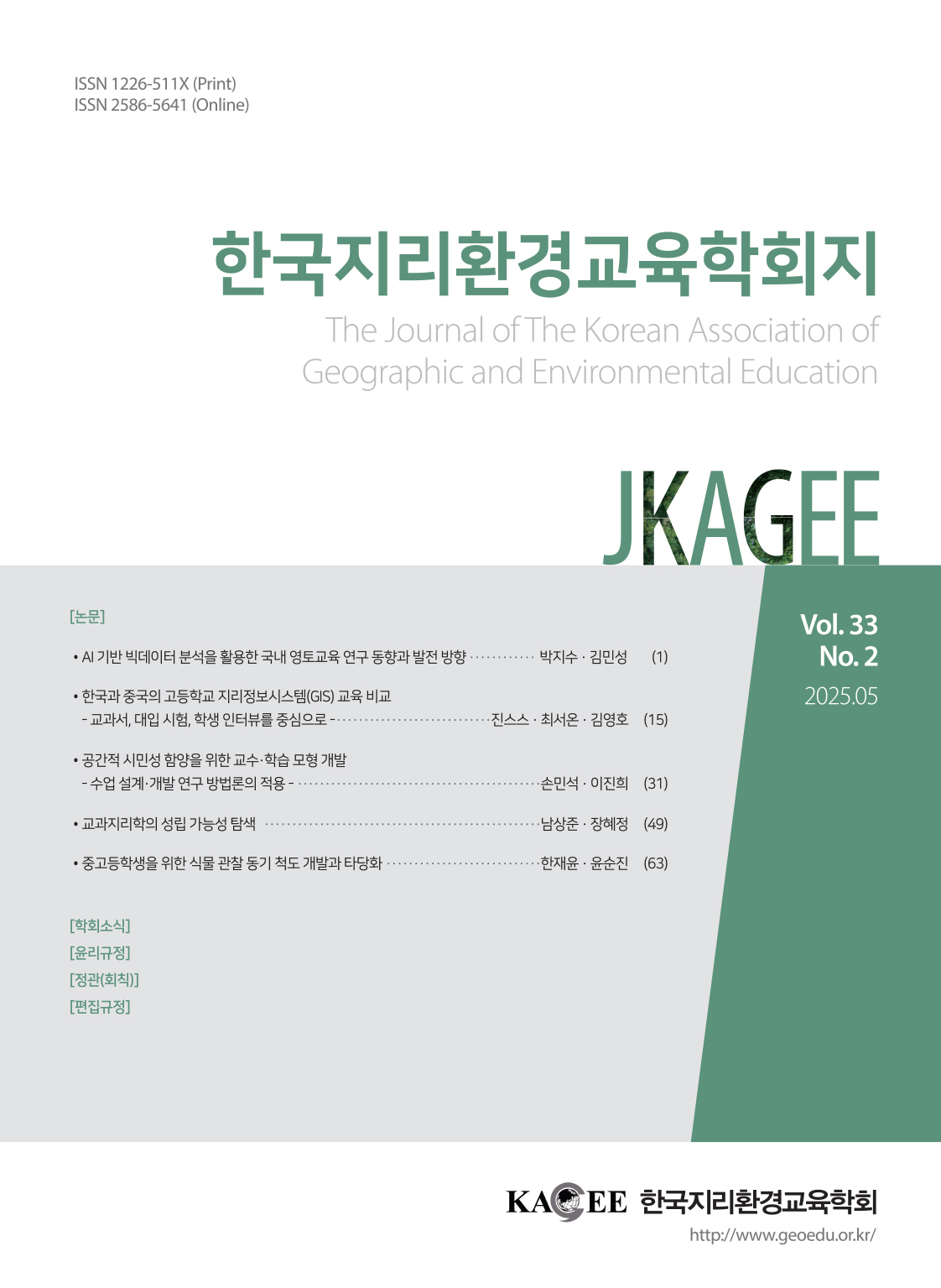Research Article
Abstract
References
Information
The purpose of this study is to investigate the characteristics and usefulness of geography lessons using Google Earth experienced by pre-service teachers. A education program focused on Google Earth-based lesson design assignments and reflective experience was designed and applied. The conceptual framework of the technological pedagogical, and content knowledge (TPACK) was used to analyze the performance of pre-service teachers qualitatively. Results indicate that instructional scaffolding plays an important role in integrating Google Earth in pedagogically meaningful ways, depending on geography contents. Specifically, pre-service teachers used the zoom and mapping function of Google Earth to connect concepts at the global level (e.g. path) and phenomena at the local level (e.g. religion). Using the panorama and dimension function, geography lessons was designed to actually observe the features of large-scale topography and urban structures that are difficult to experience with the eyes. In the case of controversial issues, they designed problem solving or role-play lessons based on Google Earth data. And pre-service teachers have experienced that Google Earth is a useful tool to support students' development of geographic concepts, skills and spatial thinking, and to enhance their teaching expertise.
이 연구의 목적은 예비교사들이 경험하는 구글어스 활용 지리수업의 특징과 유용성을 조사하는 것이다. 지리교육에서 테크놀로지의 중요성은 계속 증가하고 있으며, 교사들의 실천적인 테크놀로지 활용 역량이 요구되고 있다. 이를 위해 본 연구에서는 구글어스 기반의 지리수업 설계 과제와 반성적 경험을 특징으로 하는 프로그램을 개발하고 적용하였으며, 예비교사들의 수행 과정을 테크놀로지 교수내용지식(TPACK) 개념적 틀을 활용해 분석하였다. 주요 연구 결과는 다음과 같다. 수업 프로그램을 통해 예비교사들은 구글어스, 지리 내용, 그리고 교수법을 의미있는 방식으로 통합하였다. 구체적으로 예비교사들은 줌, 매핑, 스트리트뷰 기능을 활용해 지구적 수준의 개념(예, 경로)과 지역적 수준의 현상(예, 종교)을 연결하였으며, 구글어스의 차원과 파노라마 기능을 활용해 눈으로 직접 경험하기 힘든 큰 규모의 지형과 도시구조의 특징을 실제로 관찰하게 하는 수업을 설계하였다. 그리고 논쟁적 이슈의 경우, 구글어스의 자료를 근거로 하는 문제해결이나 역할극 수업을 설계하였다. 이러한 경험을 바탕으로 예비교사들은 구글어스가 학생들의 지리개념 이해를 촉진하고, 지리적 기능과 공간적 사고의 발달을 지원하고, 지리교사의 수업 전문성을 높이는데 유용한 도구임을 인식하였다.
- 강순자・장미라, 2016, "중학교 수학교사의 테크놀로지 통합 자기효능감에 관한 연구", 수학교육, 55(4), 523-538. 10.7468/mathedu.2016.55.4.523
- 교육부, 2015, 사회과교육과정, 교육부 고시 제2015-74호 [별책7]
- 구순옥・남상준, 2019, "커뮤니티매핑 기반 참여적 환경지도 제작 활동 효과", 한국지리환경교육학회지, 27(2), 131-145. 10.17279/jkagee.2019.27.2.131
- 김민성・유수진, 2014, "지리공간기술을 이용하는 목표기반시나리오 학습모듈 개발", 사회과교육, 53(1), 79-93.
- 김성원・이영준, 2018, "프로그래밍 기반 TPACK 교육 프로그램이 예비 교사의 자아효능감에 미치는 효과", 컴퓨터교육학회지, 21(5), 49-59.
- 설문규・손창익, 2012, "초등학교에서 스마트 교육에 대한 교사들의 활용 인식 조사", 한국정보교육학회지, 16(3), 309-318.
- 엄미리・신원석・한인숙, 2011, "테크놀로지 내용교수지식(TPACK) 역량에 대한 예비교사의 인식분석", 한국교원교육연구, 28(4), 141-165. 10.24211/tjkte.2011.28.4.141
- 이다희・황우형, 2018, "수학교사의 테크놀로지 교수내용지식(TPACK)에 대한 연구: TPACK에 대한 인식 및 교육요구도 분석", 수학교육, 57(1), 1-36.
- 이민희, 2014, "예비 중등수학교사의 테크놀로지 교수학적 내용지식(TPACK) 함양 과정 분석 및 모델 구축", 이화여자대학교 일반대학원 박사학위논문.
- 이종원, 2012, "공간정보기술의 활용과 교실수업의 변화 : 여섯 교사의 사례", 대한지리학회지, 47(6), 955-974.
- 이진희・조인정, 2016, "지리공간기술의 지리교육현장 적용에 대한 예비교사들의 태도 연구", 한국지리학회지, 5(2), 85-93. 10.25202/JAKG.5.2.1
- 조헌・전보애・조대헌, 2018, "지리정보기술을 활용한 지역문제 탐구형 창의적 체험활동 프로그램의 개발 및 적용 - 강릉 해안침식 문제를 중심으로", 한국사진지리학회지, 28(2), 89-112.
- 최경식・백성혜, 2020, "예비교사의 TPACK 역량 측정 설문과 수행평가 결과의 차이", 한국과학교육학회지, 40(4), 437-449.
- Angeli, C. and Valanides, N., 2009, Epistemological and methodological issues for the conceptualization, development, and assessment of ICT-TPCK: Advances in technological pedagogical content knowledge(TPCK), Computers & Education, 52, 154-168. 10.1016/j.compedu.2008.07.006
- Chien, Y. T., Chang, C. Y., Yeh, T. K., and Chang, K. E., 2012, Engaging pre-service science teachers to act as active designers of technology integration: A MAGDAIRE framework, Teaching and Teacher Education, 28, 578-588. 10.1016/j.tate.2011.12.005
- Doering, A., Koseoglu, S., Scharber, C., Henrickson, J., and Lanegran, D., 2014, Technology integration in K-12 geography education using TPACK as a Conceptual Model, Journal of Geography, 113, 223-237. 10.1080/00221341.2014.896393
- Doering, A., Veletsianos, G., and Scharber, 2007, Coming of age: Research and pedagogy on geospatial technologies within K-12 social studies education, in Milson, A. J., and Alibrandi, M. (eds.), Digital Geography: Geo-Spatial Technologies in the Social Studies Classroom , Information Age Publishing, Charlotte, North Carolina, pp. 213-226.
- Ertmer, P. A., 2005, Teacher pedagogical beliefs: The final frontier in our quest for technology integration? Educational Technology Research and Development, 53(4), 25-39. 10.1007/BF02504683
- Ertmer, P. A. and Ottenbreit-Leftwich, A. T., 2010, Teacher technology change: how knowledge, confidence, beliefs, and culture Intersect, Journal of Research on Technology in Education, 42(3), 255-284. 10.1080/15391523.2010.10782551
- Ertmer, P. A., Ottenbreit-Leftwich, A. T., and Cindy, S. Y., 2007, Exemplary teachers: perceptions of factors influencing success, Journal of Computing in Teacher Education, 23(2), 55-61.
- Golledge, R. G., 2002, The nature of geographic knowledge, Annals of the Association of American Geographers, 92(1), 1-14. 10.1111/1467-8306.00276
- Hall, G. E. and Hord, S. M., 2006, Implementing change: patterns, principles, and potholes(2nd ed.), Pearson/Allyn & Bacon, Boston (양성관・손희권・박종필・이용운・이경호・전상훈・운수정 공역, 2011, 학교 변화와 혁신: 패턴, 원리, 당면과제, 학지사)
- Hennessey, S., Ruthven, K., and Brindley, S., 2005, Teacher perspectives on integrating ICT into subject teaching: Commitment, constraints, caution, and change, Journal of Curriculum Studies, 37, 155-192. 10.1080/0022027032000276961
- Hermans, R., Tondeur, J., van Braak, J., and Valcke, M., 2008, The impact of primary school teachers' educational beliefs on the classroom use of computers, Computers and Education, 51, 1499-1509. 10.1016/j.compedu.2008.02.001
- Hew, K. F. and Brush, T., 2007, Integrating technology into K-12 teaching and learning: Current knowledge gaps and recommendations for future research, Educational Technology Research and Development, 55(3), 223-252. 10.1007/s11423-006-9022-5
- Howard S. K., 2013, Risk-aversion: Understanding teachers' resistance to technology integration, Technology, Pedagogy and Education, 22(3), 357-372. 10.1080/1475939X.2013.802995
- Koehler, M. J. and Mishra, P., 2005, What happens when teachers design educational technology? the development of technological pedagogical content knowledge, Journal of Educational Computing Research, 32(2), 131-152. 10.2190/0EW7-01WB-BKHL-QDYV
- Koehler, M. J. and Mishra, P., 2009, What is technological pedagogical content knowledge? Contemporary Issues in Technology and Teacher Education, 9(1), 60-70.
- Koehler, M. J., Shin, T. S., and Mishra, P., 2012, How do we measure TPACK? Let me count the ways, in Ronau, R. N., Rakes, C. R., and Niess, M. L. (eds.), Educational Technology, Teacher Knowledge, and Classroom Impact: A Research Handbook on Frameworks and Approaches, Information Science Reference, Hershey PA, 16-31. 10.4018/978-1-60960-750-0.ch002
- Mishra, P. and Koehler, M., 2006, Technological pedagogical content knowledge: A framework for teacher knowledge, Teachers college Record, 108(6), 1017-1054. 10.1111/j.1467-9620.2006.00684.x
- Patterson, T. C., 2007, Google Earth as a (not just) geography education tool, Journal of Geography, 106(4), 145-152. 10.1080/00221340701678032
- Ratinen, I. and Keinonen, T., 2011, Student-teachers' use of Google Earth in problem-based geology learning, International Research in Geographical and Environmental Education, 20(4), 345-358. 10.1080/10382046.2011.619811
- Schmidt, D. A., Baran, E., Thompson, A. D., Mishra, P., Koehler, M. J., and Shin, T. S., 2009, Technological pedagogical content knowledge(TPACK): The development and validation of an assessment instrument for pre-service teachers, Journal of Research on Technology in Education , 42(2), 123-149 10.1080/15391523.2009.10782544
- Thompson, A. and Mishra, P., 2007, Breaking News: TPCK becomes TPACK! Journal of Computing in Teacher Education , 24(2), 38-64.
- Woreny, L., Venkatech, V., and Abrami, P. C., 2006, Implementing computer technologies: Teachers' perceptions and practices, Journal of Information Technology for Teacher Education , 14(1), 173-207.
- Xiang, X. and Liu, Y., 2016, Understanding 'change' through spatial thinking using Google Earth in secondary geography, Journal of Computer Assisted Learning, 33(1), 1-14. 10.1111/jcal.12166
- Zhao, Y. and Frank, K. A., 2003, Factors affecting technology uses in schools: An ecological perspective, American Educational Research Journal, 40(4), 807-840. 10.3102/00028312040004807
- Publisher :The Korean Association Of Geographic And Environmental Education
- Publisher(Ko) :한국지리환경교육학회
- Journal Title :The Journal of The Korean Association of Geographic and Environmental Education
- Journal Title(Ko) :한국지리환경교육학회지
- Volume : 29
- No :1
- Pages :73-87
- DOI :https://doi.org/10.17279/jkagee.2021.29.1.73



 The Journal of The Korean Association of Geographic and Environmental Education
The Journal of The Korean Association of Geographic and Environmental Education







